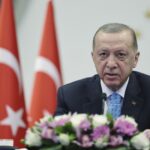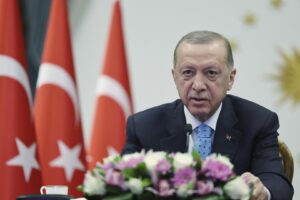‘They knew the view out of my apartment,’ says activist alleging she’s being surveilled
There are growing concerns from Iranian-Canadians who say they are being threatened, monitored and even followed at protests and outside their homes by affiliates of the Iranian regime who are here in Canada.
“They know the view out of my apartment. They said it was a school. That I have three cats. They knew the friends that have come to my house,” said Maryam Shafipour, an Iranian activist who now lives in Canada and who is speaking out against the regime despite the dangers.
Last year, members of the Islamic Revolutionary Guard — a branch of the Iranian forces designated as a terrorist organization in the U.S. — took that information about her life back to her sister in Iran, Shafipour said, and used it to try to threaten her family and lure her back to the country.
“After that I just cut my relationship with all my friends because I’m really scared,’ said Shafipour. “I am just isolated now.”
Shafipour has reason to be afraid. She once spent two months in solitary confinement in Tehran’s notorious Evin Prison for “spreading propaganda against the system” — the same prison where Mahsa Amini was held. Amini’s arrest on Sept. 13, reportedly for not following Iran’s strict dress code, and death in detention has sparked months of major protests inside and outside Iran.
Last week, for the first time, CSIS confirmed that it is investigating “several threats to life emanating from the Islamic Republic of Iran.”
But Shafipour and other activists told CBC News they’ve had no help from Canadian police or government officials and don’t feel like the threat here is being taken seriously.

Concerns of digital spying
Shafipour’s not the only one who has been monitored in Canada.
In 2021, the FBI publicized details of a plot to kidnap Iranian-American activist Masih Alinejad from her home in New York — part of that report revealed plots to kidnap three unnamed people here in Canada.
The Government of the Islamic Republic of Iran even hired private investigators in Brooklyn, N.Y., and in Canada to spy on Alinejad and four other dissidents, according to court documents.
Shafipour is worried the Iranian government hacked into her phone. Curious if there was indeed spyware on her phone, Shafipour sat with experts at Citizen Lab, a cybersecurity lab in Toronto that helps human rights activists under threat of digital espionage.
She said she’s grateful someone took her seriously, adding Canadian authorities hadn’t looked into her case at all.
“We know for a fact that they [Islamic Republic] have extensive technologies that enable them to drill right down into people’s personal mobile phones, know where they are, with whom they’re communicating with,” said Ron Deibert, director of Citizen Lab.
“It’s common actually for people in your situation to have agents or people who are sympathetic to the government within Canada follow them around, maybe try to intimidate them,” he said.
Threatening texts
It’s not just high-profile activists like Shafipour and Alinejad who feel in danger; others with no public profile believe they are no longer safe to publicly criticize the regime. Two people spoke to CBC News on the promise of anonymity due to fears for their safety and the safety of their families back in Iran.
They say they have received threatening calls and a text message to cell phone numbers that were supposed to be private.
The messages warned them to stop posting on social media and speaking out about Iran.
“I have so many family members living in Iran and I love them. I don’t want anything to happen to them,” said the woman who received a text in Farsi. The text was identical to another one sent to activists and journalists in Iran several years ago.
It warned her that speaking with “the enemy” abroad through “email … or other communications” was criminal and would lead to prosecution, also stating “It’s crucial for you to disconnect and this SMS is the last security warning.”
The other person, a young man, received a series of phone calls from blocked and local Canadian numbers questioning why he had posted negatively about Iran on social media — using accounts that were private.
“He repeated himself multiple times and I was terrified and I dropped the call,” said the man.
Even more frightening, the caller addressed him by name. He doesn’t know how either he or his number were found.
Both feel they have been watched at protests with people in the crowd using their phones to take pictures of their faces. They believe that information is then sent back to the Iranian government.
“I feel terrified,” the man added.
These two young Iranian Canadians went to police and say they could not get past reception. They claim they were told no one could help them.
“I feel like the police, whether in Toronto or anywhere in Canada … wait until someone dies and then they will do something,” said one of them.
CSIS investigating ‘several threats’
CBC spoke with others who had similar stories and who say they have been to police, the RCMP and even CSIS without hearing back.
When asked by CBC News about the rise in Iranian dissidents receiving threats in Canada, the RCMP said in a statement they believe the problem “is growing” but said they can’t quantify it as they believe it is still underreported.
CSIS has acknowledged they are monitoring the situation, announcing for the first time last Friday they are investigating “several threats to life emanating from the Islamic Republic of Iran”.

“Canadians are not getting how serious this issue is,” Ardeshir Zarezadeh said.
Zarezadeh, an Iranian-Canadian who once spent two years in solitary confinement in an Iranian prison, believes the regime’s presence in Canada is growing, causing distress and confusion in his community.
“They [the Iranian regime and its affiliates] have businesses here. Non-governmental organizations. Houses. They are everywhere. And everyone knows it,” he said.
Zarezadeh said a couple years ago, a member of the regime showed-up at his Toronto legal offices after calling to make an appointment from a payphone. He was denied an appointment but showed up suddenly anyway, catching Zarezadeh in the lobby.
“He asked to speak to me for my legal services, I told him I was in a rush, but I felt nervous immediately, ” Zarezadeh said.
Zarezadeh said he quickly ended the conversation saying he had to go and that the man left.
“I met so many intelligence officers when I was in Iran. I was arrested 12 times. So many of them interrogated me, so I know how they behave, talk, react.”

He immediately contacted the FBI who confirmed to him that the visitor was a known threat and a top regime operative, and warned him to be very careful.
He says after calls to the RCMP over the matter, they have not followed-up with him.
“The RCMP never responded to my messages. What’s wrong with the government? Why are they not taking action?
Zarezadeh has taken matters into his own hands. He’s compiling a list of names and addresses of known regime affiliates here in Canada and is prepared to make that list public as well as sharing it with the government and other intelligence agencies.
“I don’t feel safe in Canada. I am constantly watching my back, I bring people with me everywhere I go because who knows any day now I could get a knife in my back,” Zarezadeh said.
CBC News asked the federal minister of public safety about the lack of police response. We are still waiting for an answer.
Source: CBC
















